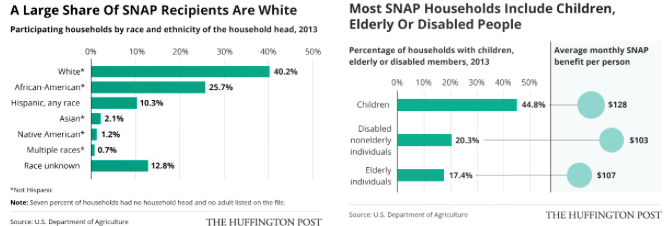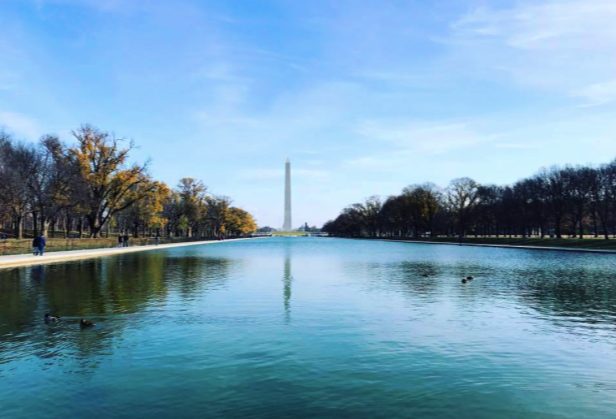As we enter into 2019, a new year, we have come to see that the government shutdown is not ending anytime soon. Donald Trump is on track to have the longest government shutdown in recent history if it lasts until Sunday. It may be a temper tantrum for the president. For many, this shutdown is putting them in financial burdens that they may not be able to fully recover from for a while. A lot of families have had to defer payments for their bills, however, as we all know, those bills accumulate interest and other fees if they aren’t paid on time.
There are some government programs that only have funding up until February. Approximately 40 Million Americans who receive assistance in food stamps will have their benefits at least until the end of this month. 40 million is a lot of people that depend on their government to help them. Below you will see some graphics of what this breaks down to according to the Huffington Post.
In Baltimore, the Howard School district is offering free lunch to children and families that have been affected by the shut down. “No child should go hungry and no parent should fear their child will not eat because they cannot afford to pay for meals during this government shutdown period,” Schools Superintendent Michael Martirano said in a statement. “The shutdown of the federal government has caused financial insecurity for so many of our friends and neighbors and undue stress and anxiety on their children.”
There are educational programs that will have stopped their efforts in academia because of the shutdown. We know that science and the funding for science has not been at the forefront of this administration, but underneath the politics and the ambiguity of what platform this administration wants to have, funding for science is important to the wellbeing of our education system, and our competitiveness across the world in the scientific community and beyond.
Colleges and Universities that rely on funding from the National Science foundation, and from multiple other entities are currently being impacted! “While the NSF is a pretty huge and important funding agency, others are science funding agencies…are part of the shutdown which means that they are not able to review grant proposals and interact with the scientists that they are funding in the extramural community at our universities,” said Jennifer Poulakidas, vice president of congressional and governmental affairs at the Association of Public and Land Grant Universities (APLGU).
The work done by the science agencies to award and monitor grant funding is on hold, it is shutdown for now. If the shutdown continues, Poulakidas said scientists will eventually be impacted by grant funding running out and the outcome will be a blow in the gut to science and to our researchers who depend on this knowledge and purpose for the advancement of education in this field.
“The way that we fund science in this country is considered the best in the world and this will have a major impact on our ability to be preeminent in science research if we don’t get the funding up and running again,” Poulakidas said. “While our universities and researchers do receive some funding from non-U.S. government sources, the overwhelming majority of the funding that our scientists compete for and receive is from the federal government.”
Education is important in all fields. We need to make sure that we continue to put pressure so that programs like these can continue to serve America. If the president really put Americans first, and wanted to be the best in the world, he would end this shutdown, and work across the board to make sure that Americans can go back to work and that families could have their livelihoods back. This shutdown is more than just a border security issue, it is to serve a personal agenda item that continues to divide our country on the backs of everyday working Americans.
In order to restore funding, the APLGU is working with member universities to talk to their members of Congress and the Trump administration to make the case that the shutdown needs to end as soon as possible
Jocelyn Sida
Since then, Jocelyn has worked around the country in numerous campaigns. From her own bid for the school board in Fontana, CA , a town about 45 minutes east of Los Angeles in 2012, Jocelyn and her family worked tirelessly to promote environmental learning, community sustainability and liberal arts education. An effort to promote civic engagement and inspire the community to fight for education equality, immigration and healthcare through their vote, Jocelyn challenged incumbents in a tight race for the school board seat. Out of 11 candidates Jocelyn came in 4th with 5,697 votes. With an incredible showing for a grassroots campaign, Jocelyn’s political career progressed.
From Hawaii to New York, Miami to Chicago, and Los Angeles to Las Vegas, Jocelyn has worked in the Latino community to engage and organize the community in areas of technology, politics, health care, gender equality, reproductive rights issues, and immigration. Jocelyn continues work in diverse communities. She currently lives in Las Vegas, NV.
Latest posts by Jocelyn Sida (see all)
- De Los Cupones de Alimentos a la Investigación Científica: Cómo el Cierre del Gobierno Afecta a la Educación - January 15, 2019
- From Food Stamps to Science Research: How the Government Shutdown Hits Education - January 11, 2019
- Cinco Ideas de Regalos Navideños para Educadores - December 20, 2018
- Five Holiday Gift Ideas for Educators - December 19, 2018
- Mi Experiencia en ESL Me Ayudó a Definirme - September 19, 2017

